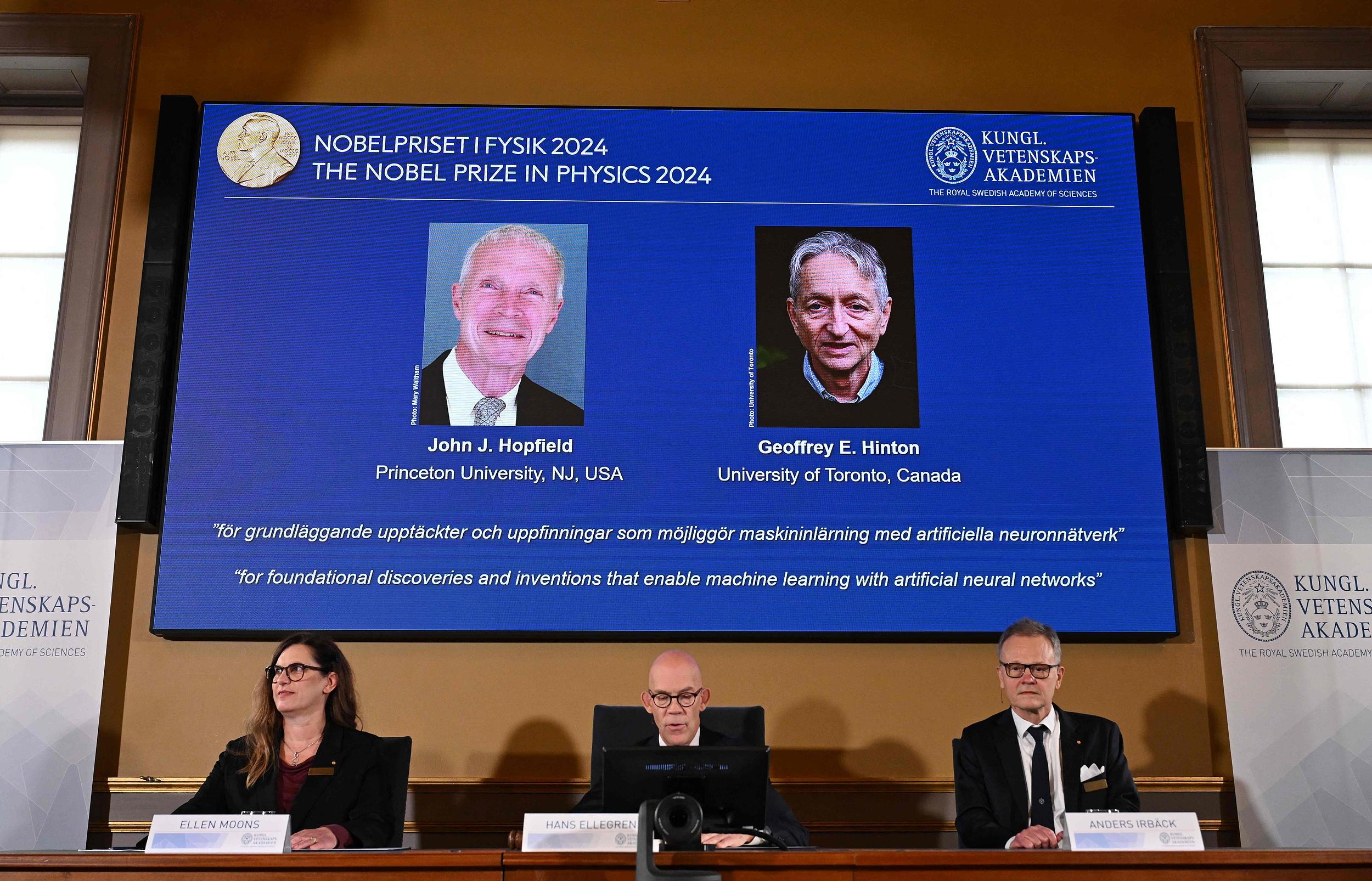Nobel Prize in the AI Era?

A screen shows the laureates of the 2024 Nobel Prize in Physics during the announcement at the Royal Swedish Academy of Sciences in Stockholm, Sweden on October 8, 2024. (PHOTO: VCG )
By GONG Qian
AI stole the show at the 2024 Nobel Prizes. AI pioneers John Hopfield and Geoffrey Hinton won the prize in physics, using physics tools to develop methods that are the foundation of today's powerful machine learning. David Baker, Demis Hassabis and John Jumper jointly won the prize in chemistry. The latter two from Google DeepMind have developed an AI model to solve a 50-year-old problem: predicting proteins' complex structures.
The prizes awarded to these scientists working in the field of AI has ignited heated discussions on social media platforms. Some are asking, will future science challenges be handed over directly to AI to solve? Do we still need human scientists?
This year's prizes highlight a new trend: AI technology is driving a paradigm shift in scientific research. AI has become a crucial tool for addressing long-standing and complex problems in fields such as physics, chemistry, biology, and medicine.
It is establishing a paradigm with which, theoretically, any scientific problem can be solved. The operation starts with practical issues, transforming them into data that AI can process, running it through deep learning networks, and ultimately producing results. Many scientists think that AI will push the boundaries of traditional frameworks, leading to more profound and far-reaching innovations.
AI and humans are complementary, not each other's substitutes. AI can be powerful in scientific research, assisting with data handling, experimental simulations, and result predictions. In 2020, Hassabis and Jumper presented an AI model called AlphaFold2. With its help, they have been able to predict the structure of virtually all the 200 million proteins that researchers have identified. Since their breakthrough, AlphaFold2 has been used by more than two million people from 190 countries, the Nobel committee at the Royal Swedish Academy of Sciences said.
However, the intuition, creativity, and decision-making abilities of human scientists remain irreplaceable. Humans possess creative and interdisciplinary thinking, which allows them to pose new questions and introduce fresh perspectives into their research, accelerating the pace of scientific discovery.
Many decisions in research require complex judgments, including dealing with uncertainty, risk assessment, and interpreting experimental outcomes, which typically rely on human intuition and experience. When setting research agendas and determining directions, humans also consider ethics and morality, areas that AI struggles to understand or address.
However, as AI technology matures and is widely applied across industries, we indeed face a series of challenges, such as balancing technological innovation with privacy protection, ensuring transparency and fairness in algorithmic decision-making, and guaranteeing that technological development serves the welfare of all.
Other issues including the infringement of intellectual property, leakage of personal information, and fabrication of false experimental data must also be addressed.
Hinton, widely regarded as the "godfather of AI," and Hopfield have also expressed their concerns. "We also have to worry about a number of possible bad consequences. Particularly the threat of these things getting out of control," Hinton said via phone at the Nobel press conference. Hopfield said there was something unnerving about the unknown potential and limits of AI.
In response, we must further refine and strengthen existing ethical regulations for research by developing policies that promote the healthy development of AI-assisted research and mitigating the risks associated with AI.
The Nobel Prizes awarded for achievements in AI not only recognize technical breakthroughs but also celebrate human ingenuity. We humans should have an open and inclusive attitude towards new technologies, take responsibility for guiding their healthy development, and ensure that technological advancements contribute to social equity and justice.







